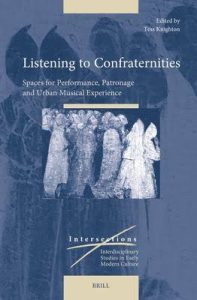Author: Alexander Fisher
Publication details: In Listening to Confraternities: Spaces for Performance, Patronage and Urban Musical Experience, edited by Tess Knighton, 272–304. Leiden: Brill, 2024.
Weblink: https://doi.org/10.1163/9789004702776_012
Abstract:
The fate of confraternities in post-Reformation Germany was profoundly shaped by the history of religious division. On the eve of the Reformation, major cities like Cologne and Augsburg enjoyed a vibrant confraternal tradition balancing spiritual devotion and public charity, but the advancement of Lutheranism would undermine confraternities alongside traditional clerical, monastic and devotional culture. The Council of Trent would lay the groundwork for a revival in confraternities in the German-speaking lands (as elsewhere), but a crucial question would be the degree to which they would be instrumentalised in the service of Catholic reform and renewal. If some late-medieval confraternities managed to persist, many new confraternities emerging in the late sixteenth and early seventeenth centuries devoted themselves to potentially divisive spiritual objects – the Virgin Mary, the Eucharist, the Rosary, and the communion of Saints – and explicitly embraced a Tridentine agenda. The most striking development was the Jesuit establishment of Marian Congregations whose membership cut across lines of social class and, eventually, gender as well. The marked increase in confraternities and Jesuit-led congregations in German cities was accompanied by a soundscape that embraced songs, litanies, polyphony and a variety of other acoustic phenomena. The periodic meetings of confraternities were a locus for music of varying sophistication, while the processions that increasingly shaped urban space featured sounds ranging from songs, litanies and polyphony to bell-ringing and even gunfire. Songs were prescribed in confraternal statutes and handbooks, and some confraternities (such as the Andernach Confraternity of St. Cecilia and the Ingolstadt Congregation of Mary Victorious) even enjoyed bespoke songbooks printed for their use. Collections of litanies were published with the devotions and processions of confreres in mind, most notably the great Thesaurus litaniarum (1594) by the music director of the Munich Jesuits, Georg Victorinus. Some confraternities enjoyed rather sophisticated musical cultures and formed ready audiences for the burgeoning amount of distinctly Catholic polyphony issued by German presses after 1600. Specific collections issued by composers like Bernhard Klingenstein, Gregor Aichinger, and Rudolph di Lasso – some of them confreres themselves – offered music suited to a range of abilities, thus situating confraternities as a nexus where varied Catholic acoustic cultures might blend and interact.
